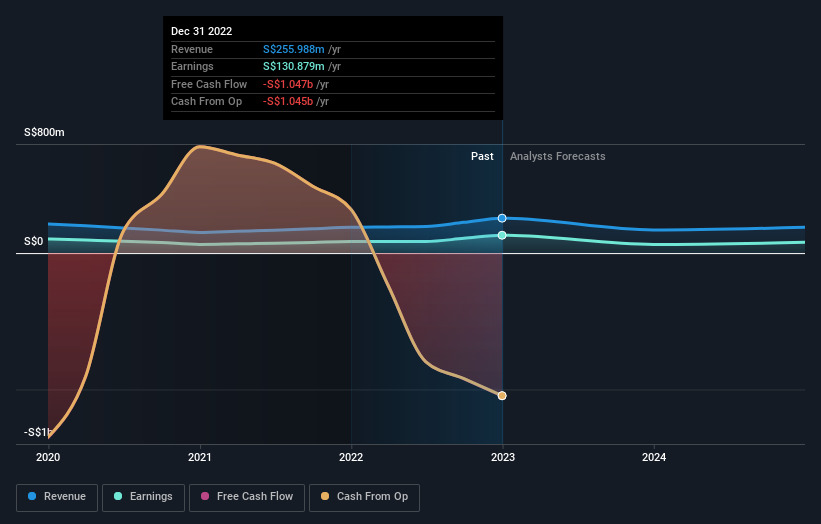While individual investors own 33% of Hong Leong Finance Limited (SGX:S41), private companies are its largest shareholders with 57% ownership
Key Insights
The considerable ownership by private companies in Hong Leong Finance indicates that they collectively have a greater say in management and business strategy
The largest shareholder of the company is Hong Leong Investment Holdings Pte. Ltd. with a 55% stake
Past performance of a company along with ownership data serve to give a strong idea about prospects for a business
A look at the shareholders of Hong Leong Finance Limited (SGX:S41) can tell us which group is most powerful. The group holding the most number of shares in the company, around 57% to be precise, is private companies. That is, the group stands to benefit the most if the stock rises (or lose the most if there is a downturn).
Meanwhile, individual investors make up 33% of the company’s shareholders.
Let's take a closer look to see what the different types of shareholders can tell us about Hong Leong Finance.
Check out our latest analysis for Hong Leong Finance
What Does The Institutional Ownership Tell Us About Hong Leong Finance?
Institutions typically measure themselves against a benchmark when reporting to their own investors, so they often become more enthusiastic about a stock once it's included in a major index. We would expect most companies to have some institutions on the register, especially if they are growing.
We can see that Hong Leong Finance does have institutional investors; and they hold a good portion of the company's stock. This can indicate that the company has a certain degree of credibility in the investment community. However, it is best to be wary of relying on the supposed validation that comes with institutional investors. They too, get it wrong sometimes. If multiple institutions change their view on a stock at the same time, you could see the share price drop fast. It's therefore worth looking at Hong Leong Finance's earnings history below. Of course, the future is what really matters.
Hedge funds don't have many shares in Hong Leong Finance. Looking at our data, we can see that the largest shareholder is Hong Leong Investment Holdings Pte. Ltd. with 55% of shares outstanding. With such a huge stake in the ownership, we infer that they have significant control of the future of the company. In comparison, the second and third largest shareholders hold about 3.1% and 2.0% of the stock. Furthermore, CEO Leng Beng Kwek is the owner of 1.5% of the company's shares.
Researching institutional ownership is a good way to gauge and filter a stock's expected performance. The same can be achieved by studying analyst sentiments. There is some analyst coverage of the stock, but it could still become more well known, with time.
Insider Ownership Of Hong Leong Finance
While the precise definition of an insider can be subjective, almost everyone considers board members to be insiders. Management ultimately answers to the board. However, it is not uncommon for managers to be executive board members, especially if they are a founder or the CEO.
Insider ownership is positive when it signals leadership are thinking like the true owners of the company. However, high insider ownership can also give immense power to a small group within the company. This can be negative in some circumstances.
Shareholders would probably be interested to learn that insiders own shares in Hong Leong Finance Limited. As individuals, the insiders collectively own S$44m worth of the S$1.1b company. This shows at least some alignment. You can click here to see if those insiders have been buying or selling.
General Public Ownership
With a 33% ownership, the general public, mostly comprising of individual investors, have some degree of sway over Hong Leong Finance. While this size of ownership may not be enough to sway a policy decision in their favour, they can still make a collective impact on company policies.
Private Company Ownership
We can see that Private Companies own 57%, of the shares on issue. It might be worth looking deeper into this. If related parties, such as insiders, have an interest in one of these private companies, that should be disclosed in the annual report. Private companies may also have a strategic interest in the company.
Next Steps:
While it is well worth considering the different groups that own a company, there are other factors that are even more important. Case in point: We've spotted 3 warning signs for Hong Leong Finance you should be aware of, and 2 of them can't be ignored.
If you are like me, you may want to think about whether this company will grow or shrink. Luckily, you can check this free report showing analyst forecasts for its future.
NB: Figures in this article are calculated using data from the last twelve months, which refer to the 12-month period ending on the last date of the month the financial statement is dated. This may not be consistent with full year annual report figures.
Have feedback on this article? Concerned about the content? Get in touch with us directly. Alternatively, email editorial-team (at) simplywallst.com.
This article by Simply Wall St is general in nature. We provide commentary based on historical data and analyst forecasts only using an unbiased methodology and our articles are not intended to be financial advice. It does not constitute a recommendation to buy or sell any stock, and does not take account of your objectives, or your financial situation. We aim to bring you long-term focused analysis driven by fundamental data. Note that our analysis may not factor in the latest price-sensitive company announcements or qualitative material. Simply Wall St has no position in any stocks mentioned.
Join A Paid User Research Session
You’ll receive a US$30 Amazon Gift card for 1 hour of your time while helping us build better investing tools for the individual investors like yourself. Sign up here


